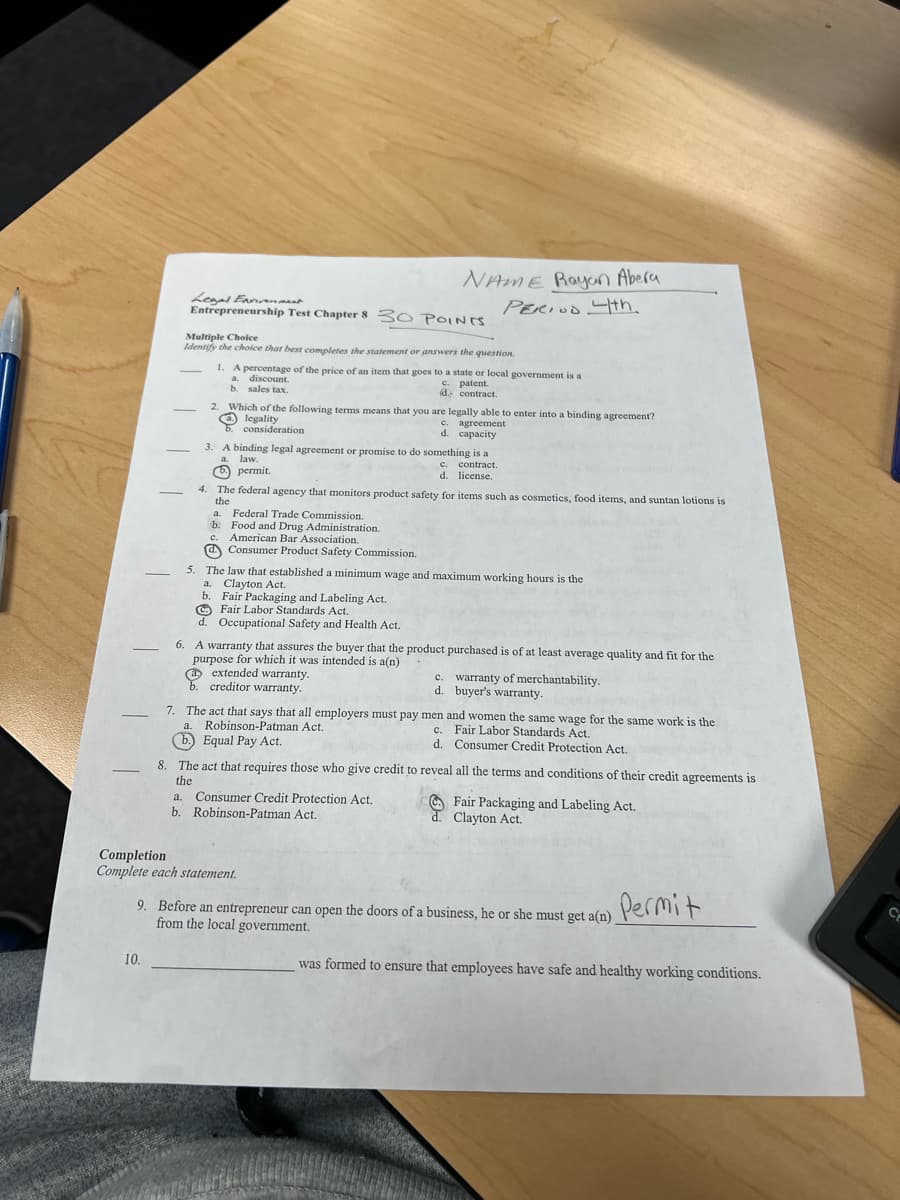Multiple Choice Identify the choice that best completes the statement or answers the question. 1. A percentage of the price of an item that goes to a state or local government is a a. discount. b. sales tax. c. patent. (d, contract. 2. Which of the following terms means that you are legally able to enter into a binding agreement? b. legality consideration c. agreement d. capacity 3. A binding legal agreement or promise to do something is a a. law, C. contract. permit. d. license.
Multiple Choice Identify the choice that best completes the statement or answers the question. 1. A percentage of the price of an item that goes to a state or local government is a a. discount. b. sales tax. c. patent. (d, contract. 2. Which of the following terms means that you are legally able to enter into a binding agreement? b. legality consideration c. agreement d. capacity 3. A binding legal agreement or promise to do something is a a. law, C. contract. permit. d. license.
Essentials of Economics (MindTap Course List)
8th Edition
ISBN:9781337091992
Author:N. Gregory Mankiw
Publisher:N. Gregory Mankiw
Chapter1: Ten Principles Of Economics
Section: Chapter Questions
Problem 4CQQ
Related questions
Question
100%

Transcribed Image Text:NAME Rayan Abera
Legal Environment
PERIOD 4th.
Entrepreneurship Test Chapter 8 30 POINTS.
Multiple Choice
Identify the choice that best completes the statement or answers the question.
1. A percentage of the price of an item that goes to a state or local government is a
a.
discount.
c. patent.
b. sales tax.
d contract.
2. Which of the following terms means that you are legally able to enter into a binding agreement?
legality
C. agreement
6. consideration
d. capacity
3. A binding legal agreement or promise to do something is a
-
a.
c. contract.
law.
permit.
d. license.
4. The federal agency that monitors product safety for items such as cosmetics, food items, and suntan lotions is
-
the
a.
Federal Trade Commission.
b. Food and Drug Administration.
C.
American Bar Association.
Consumer Product Safety Commission.
5. The law that established a minimum wage and maximum working hours is the
a. Clayton Act.
b. Fair Packaging and Labeling Act.
Fair Labor Standards Act.
d. Occupational Safety and Health Act.
6. A warranty that assures the buyer that the product purchased is of at least average quality and fit for the
purpose for which it was intended is a(n)
(a) extended warranty.
c. warranty of merchantability.
d. buyer's warranty.
creditor warranty.
-
7. The act that says that all employers must pay men and women the same wage for the same work is the
a. Robinson-Patman Act.
Fair Labor Standards Act.
c.
b.) Equal Pay Act.
d. Consumer Credit Protection Act.
8. The act that requires those who give credit to reveal all the terms and conditions of their credit agreements is
the
a.
Consumer Credit Protection Act.
Fair Packaging and Labeling Act.
d. Clayton Act.
b. Robinson-Patman Act.
Completion
Complete each statement.
Permit
9. Before an entrepreneur can open the doors of a business, he or she must get a(n)
from the local government.
10.
was formed to ensure that employees have safe and healthy working conditions.
―
C
Expert Solution
This question has been solved!
Explore an expertly crafted, step-by-step solution for a thorough understanding of key concepts.
This is a popular solution!
Trending now
This is a popular solution!
Step by step
Solved in 3 steps

Knowledge Booster
Learn more about
Need a deep-dive on the concept behind this application? Look no further. Learn more about this topic, economics and related others by exploring similar questions and additional content below.Recommended textbooks for you

Essentials of Economics (MindTap Course List)
Economics
ISBN:
9781337091992
Author:
N. Gregory Mankiw
Publisher:
Cengage Learning

Principles of Macroeconomics (MindTap Course List)
Economics
ISBN:
9781285165912
Author:
N. Gregory Mankiw
Publisher:
Cengage Learning

Principles of Microeconomics (MindTap Course List)
Economics
ISBN:
9781305971493
Author:
N. Gregory Mankiw
Publisher:
Cengage Learning

Essentials of Economics (MindTap Course List)
Economics
ISBN:
9781337091992
Author:
N. Gregory Mankiw
Publisher:
Cengage Learning

Principles of Macroeconomics (MindTap Course List)
Economics
ISBN:
9781285165912
Author:
N. Gregory Mankiw
Publisher:
Cengage Learning

Principles of Microeconomics (MindTap Course List)
Economics
ISBN:
9781305971493
Author:
N. Gregory Mankiw
Publisher:
Cengage Learning

Brief Principles of Macroeconomics (MindTap Cours…
Economics
ISBN:
9781337091985
Author:
N. Gregory Mankiw
Publisher:
Cengage Learning

Principles of Macroeconomics (MindTap Course List)
Economics
ISBN:
9781305971509
Author:
N. Gregory Mankiw
Publisher:
Cengage Learning